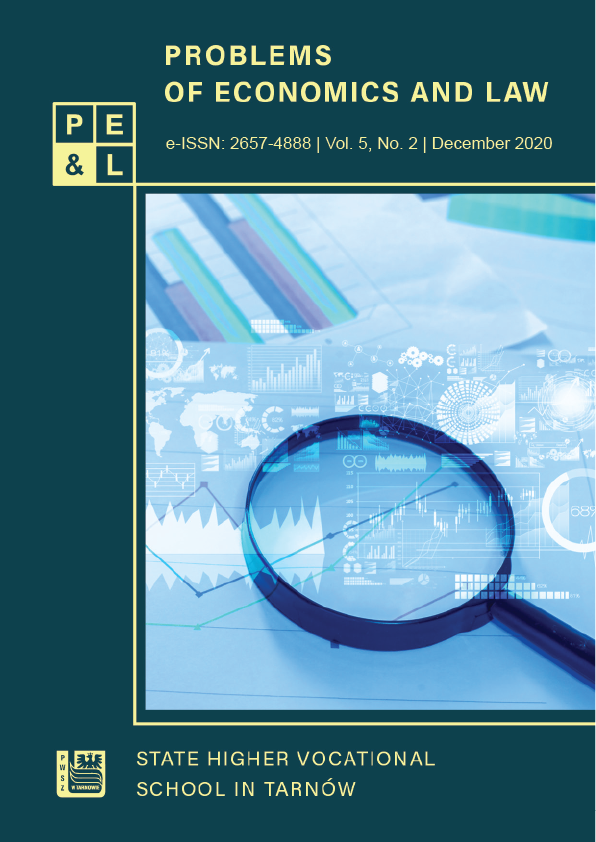The sovereignty of Polish state organisms in the years 1795–1848
DOI:
https://doi.org/10.5604/01.3001.0015.3627Keywords:
Poland 1772-1848, partitions of Poland, Austria XVIII/XIX c., Prussia XVIII/XIX c., Russia XVIII/XIX c., Duchy of Warsaw, “Congress” Kingdom of Poland, Galicia and Lodomeria, Great Duchy of Posen, history of administration XIX c., sovereignty of the state, sovereignty of the nationAbstract
Sovereignty is considered a fundamental feature of modern states. Its essence in international relations means the independence of a given state from any external entities, in particular other states. In internal relations, the position of the sovereign is occupied by the entity exercising the highest power, whose will determined all the most important matters for a given state. The article presents the issues of the sovereignty of state organisms established in Poland after the partitions of the Polish-Lithuanian Commonwealth, functioning within the political structures of individual partitioning states. These were, in particular, the Duchy of Warsaw, the Congress Kingdom of Poland, the Republic of Krakow, the Kingdom of Galicia and Lodomeria, and the Grand Duchy of Poznań. The features of non-sovereign states were held, in particular, by the Duchy of Warsaw and the Kingdom of Poland. The Republic of Kraków was a free city under the protection of great powers. The Kingdom of Galicia and Lodomeria and the Grand Duchy of Poznań had only the status of a province. The purpose of the adopted solutions was to appease the aspirations of the Polish elite to rebuild the independent Republic of Poland.
Downloads
References
Bardach J., Senkowska-Gluck M. (red.), 1981, Historia państwa i prawa Polski, t. III od rozbiorów do uwłaszczenia, Warszawa: Państwowe Wydawnictwo Naukowe. Google Scholar
Bartel W.M., 1976, Ustrój i prawo Wolnego Miasta Krakowa 1815–1846, Kraków: Wydawnictwo Literackie. Google Scholar
Błachowska K., 2001, Narodziny Imperium. Rozwój terytorialny państwa carów w ujęciu historyków rosyjskich XVIII i XIX wieku, Warszawa. Google Scholar
Davies N., Zaginione królestwa, przekład B. Pietrzyk, J. Rumińska-Pietrzyk, E. Tabakowska, Wydawnictwo Znak, Kraków 2010. Google Scholar
Chwalba A., 2000, Historia Polski 1795–1918, Kraków: Wydawnictwo Literackie. Google Scholar
Diariusz Sejmu z r. 1830–1831, wyd. M. Rostworowski, Kraków 1907, t. I, s. 242. Google Scholar
Grodziski S., 1971, Historia ustroju społeczno-politycznego Galicji 1772–1848, Wrocław Warszawa-Kraków-Gdańsk: Zakład Narodowym im. Ossolińskich. Google Scholar
Grodziski S., 2012, Rzeczpospolita krakowska, jej lata i ludzie, Kraków: Universitas. Google Scholar
Grodziski S., 1976, W Królestwie Galicji i Lodomerii, Kraków: Wydawnictwo Literackie. Google Scholar
Jaśkiewicz L. , 1979, Nowożytne samowładztwo rosyjskie i jego interpretacje, Przegląd Historyczny t.70/4 (1979), s. 679-693. Google Scholar
Jezierski A.(red.), 1994, Historia Polski w liczbach. Ludność, terytorium GUS, Warszawa. Google Scholar
Jędruch J., 1982, Constitutions, Elections and Legislatures of Poland, 1493–1993. A Guide to Their History, Pittsburgh (Studies Presented to the International Commission for the History of Representative and Parliamentary Institutions, Vol.LXXVI). Google Scholar
Juraschek, Franz von, 1878, Personal- und Realunion. Mit einem Anhange: Das rechtliche Verhältniss zwischen Oesterreich un Ungarn, Berlin, Carl Heymann’s Verlag. Google Scholar
Kallas M. (red.), 1990, Konstytucje Polski. Studia monograficzne z dziejów polskiego konstytucjonalizmu, t. 1, Warszawa: PWN. Google Scholar
Kelsen H., 1993, Allgemeine Staatslehre, Wien: Österreichische Staatsdruckerei Königlich Preussisches Patent an die sämmtlichen Stände und Einwohner der bisherigen polnischen Woywodschaften und Distrikte innerhalb des nachstehend näher beschriebenen GränzZuges [...] = Patent Króla Pruskiego IMCi do wszystkich stanow i obywatelow wojewodztw i powiatow do tego czasu polskich w linii rozgraniczenia doskonaley w nim opisaney. De Dato w Berlinie dnia 26 Grudnia Roku 1795go; Druk Jerzy Drekker [https://www.sbc.org.pl/dlibra/publication/18713/edition/39921/content, dostęp: 11-08-2021] Konfederacja Generalna Królestwa Polskiego 28 czerwca 1812. Wikiźródła, https://pl.wikisource.org; dostęp 2-08-2021]. Google Scholar
Korobowicz A., Witkowski W., 2017, Historia ustroju i prawa polskiego (1772–1918), Kraków. Google Scholar
Kronika powstań polskich 1794–1944, Marian B. Michalik (red.), Eugeniusz Duraczyński (oprac.), Warszawa: Wydawnictwo Kronika, 1994. Google Scholar
Morawski L., 2011, Suwerenność i prawo międzynarodowe – od prawa państwa do prawa ludów, „Forum Prawnicze” Nr 1 (3) styczeń 2011, s. 13-36. Google Scholar
Pęksa W., Senat Wolnego Miasta Krakowa w latach 1815–1846, Kraków 2005, Praca doktorska, niepublikowana na prawach rękopisu w BJ w Krakowie. Google Scholar
Przygodzki J., Konfederacja Generalna Królestwa Polskiego 1812–1813, Acta Universitatis Wratislaviensis No 2367, Prawo CCLXXVI, Wrocław 2002, s. 105-133. Google Scholar
Radwan M., Carat wobec Kościoła greckokatolickiego w zaborze rosyjskim 1796-1839. Lublin: Instytut Europy Środkowo-Wschodniej, 2004. Google Scholar
Recueil des traités de la France, publ. par M. De Clercq, t. 2ème 1803–1815, Paris 1864. Google Scholar
Sawicki J., 1953, Wybór tekstów źródłowych z historii państwa i prawa polskiego, tom II, Warszawa: Państwowe Wydawnictwo Naukowe. Google Scholar
Sobociński W., 1964, Historia ustroju i prawa Księstwa Warszawskiego, Toruń : TNT, 1964. Google Scholar
Stankiewicz Z. [w:] Historia państwa i prawa Polski, t. III od rozbiorów do uwłaszczenia, red. J. Bardach i M. Senkowska-Gluck, Warszawa 1981. Google Scholar
Szczaniecki M., 1970, Powszechna historia państwa i prawa, t. II Państwo burżuazyjne, Warszawa. Google Scholar
Uruszczak W., 2020, Sejm Królestwa Polskiego Kongresowego, „Kronika Sejmowa” Listopad 2020, s. 91-93. Google Scholar
Uruszczak W., 2018, Zasady ustrojowe na ziemiach polskich w okresie zaborów. Od suwerenności monarchy do suwerenności narodu. Przyczynek do historii administracji w XIX w., „Tarnowskie Colloquia Naukowe. Tarnów Scientific Colloquia. Czasopismo Państwowej Wyższej Szkoły Zawodowej w Tarnowie, Nr 1/2018, s. 21-40. Google Scholar
Wąsicki J., 1980, Ziemie polskie pod zaborem pruskim. Wielkie Księstwo Poznańskie 1815-1848, Studia nad historią państwa i prawa, Warszawa- Poznań: Zakład Narodowy im. Ossolińskich. Google Scholar
Witkowski W. , 2020, Historia administracji w Polsce 1764 - 2020, Warszawa: Wydawnictwo Naukowe PWN SA. Google Scholar
Downloads
Published
How to Cite
Issue
Section
License
Copyright (c) 2020 University of Applied Sciences in Tarnow, Poland & Author

This work is licensed under a Creative Commons Attribution-ShareAlike 4.0 International License.





